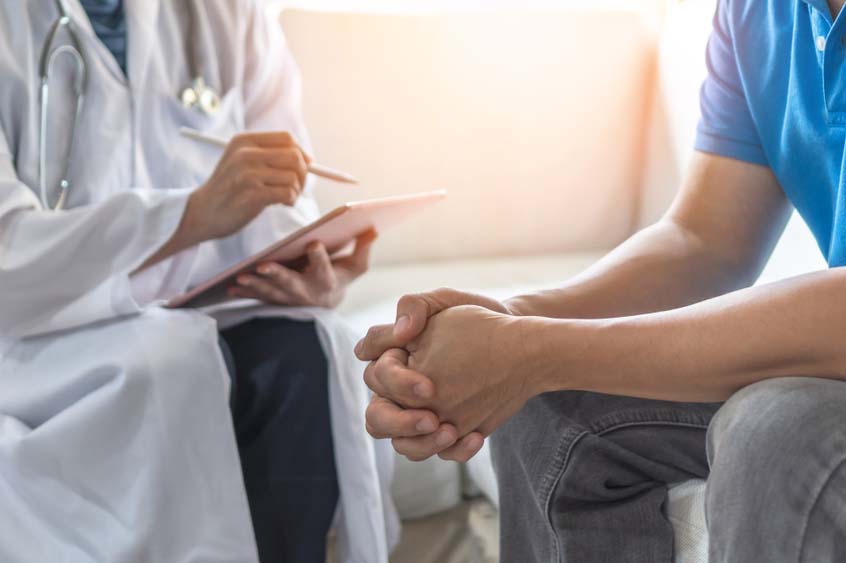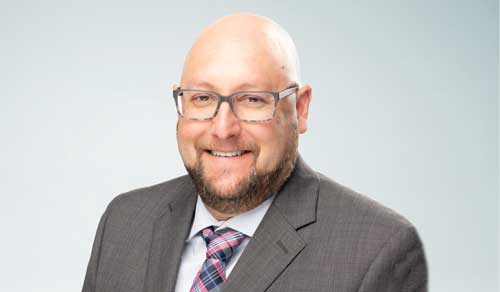Cancer is an abstract idea for many underwriters, no more tangible than a scribbled note on a CT scan or an indication on an attending physician statement (APS).
In my nearly 18-year career as an underwriter, I have underwritten hundreds – perhaps thousands – of cases for applicants with a history of cancer. In all that time, I rarely thought about what the human being behind the medical record may be going through.
That is, until my own diagnosis with Stage IIA, T3 colon cancer.
No medical record can fully capture the experience of cancer, yet the process of this disease is so important for the underwriter to understand. Insurance exists to protect people, and to do that, underwriters need to know how cancer affects human lives. Colorectal cancer is frighteningly common. According to the American Cancer Society, colorectal cancer is the third most frequently diagnosed cancer in both men and women in the United States (excluding skin cancers). And while the rate of people being diagnosed with colon or rectal cancer each year has dropped overall since the mid-1980s, largely due to improved screening, this downward trend is mostly among older adults. Incidents in younger adults (under the age of 50) has nearly doubled from 1990 to 2013.
My colon cancer certainly upended my life – and opened my eyes. Cancer taught me five lessons that made me a better person and a stronger underwriter:
1. Ask for help.
My cancer story began when I awoke early on in January 2018 with excruciating abdomen pain and an overwhelming sense of nausea, yet signs of problems were there far earlier. I had been ignoring frequent episodes of irritable bowel-like symptoms and fatigue, which I attributed to a packed travel schedule, lack of exercise, and a poor diet. Then, over a six-month period, I experienced several episodes of vomiting, diarrhea, and severe abdominal pain I dismissed as a stomach bug or food poisoning. Of course, being the know-it-all underwriter and general stubborn male that I was, I never followed up with a physician for any of these issues.
But this pain was almost debilitating. After more than two days, and only when I noticed a large amount of blood in the toilet, did I decide it was time to stop playing Dr. DeForge. My wife took me to the Emergency Room. I’ll never forget the quizzical look from the admitting nurse upon hearing my symptoms. She seemed to want to say, simultaneously: “Why on earth did you wait days to come in?”… “Oh great, another genius who thinks he’s a doctor because he looked up his symptoms on the Internet”
Underwriters love to show off vast medical knowledge when the opportunity arises, but we must remember we are not physicians. This became abundantly clear as I was being poked, prodded, and scanned. My doctors found a seven centimeter-solid malignant tumor completely occluding my colon, and I soon found myself facing emergency surgery and an uncertain outcome. Had I waited any longer, my prognosis could have been far worse.
The knowledge you accumulate over an underwriting career is no substitute for medical care. Don’t make my mistake and put off seeing a physician when you experience changes in your health, and always take the time to get recommended screenings. Since my diagnosis, I follow up with my oncologist, surgeon, and primary care provider several times a year, and I’ve honestly lost count of how many colonoscopies I’ve had.
2. Put your health and family first.
Diagnosis with a potentially lethal disease has a funny way of focusing the mind on what really matters. I gained a new appreciation for the loved ones in my life and a new determination to put health and family first. I will forever be grateful for my wife, Sara, who was with me throughout this frightening experience, and who made it far less lonely. I spent the day of my surgery floating in a narcotic induced haze, nauseous and anxious, but one thing was clear: I could not have gotten through this nearly as well without the love of my family and friends.
It also led to a startling realization for a life underwriter: I had not done enough to prepare for the possibility of my death. No one ever expects to get cancer, and prior to my hospitalization, I was a seemingly healthy and active 40-year-old, and it seemed that many end-of-life decisions could be put off another day. In less than 48 hours, all that security evaporated. When I emerged from hospital, I was 30 pounds lighter, much weaker, and far wiser, and even then, I found some habits very hard to break. During my treatment, there were several foods I had to avoid, yet, after my last surgery I decided I had recovered well enough to have a few of my favorite meals despite my physician’s advice. I ended up in the ER and getting checked back into the hospital due to my decision to not follow the recommended diet. No burrito is worth that.
I also discovered that I missed work after being away from the office for a total of 40 days. Every person heals differently, and mental healing is just as, if not more, important than physical healing. While some people benefit from spending time on introspection after a life-threatening experience, I discovered I am not among them. I grew depressed and truly looked forward to the distraction and mental stimulation of my day-to-day underwriting responsibilities. I was very fortunate to be able to return to work for a company that has great benefits and incredibly supportive and understanding people.
3. Practice patience.
A while ago, I came across a saying that stuck with me: “Do not seek the answers but learn to love the questions.” I’m no philosopher, but this seems like good advice for anyone facing a lethal disease. I honestly don’t remember much about the day of my cancer diagnosis except having a sense of anger at all the doctors and nurses entering and exiting my room asking questions but providing few answers. The first nine days I spent in the hospital felt like an eternity, and that period remains one of the lowest points in my life. While my family and friends were there to distract me from the blood draws and IV changes, when I was alone, my mind was left to wander. I thought about everything from the worst- to the best-case scenario. I worried about the possibility of dying. I worried about my career and my job. I worried about my wife. At a few points I even worried about my aging dog Grady and how he was handling my absence. In short, I worried about everything, and even after being released, I worried about the surgical pathology report, which ultimately confirmed that my tumor had not spread.
What was behind all my worrying? In my experience, life and health underwriters understand medical nuances and incomplete evidence. This is part of the science and art of risk assessment. My frustration and anxiety were fueled by my physicians’ apparent reluctance to share preliminary conclusions. No one likes to admit that they don’t know everything, yet when it comes to cancer, there are few unambiguously right and wrong answers; there are options. Almost everything in medicine involves a trade-off, and as patients we deserve to know the whole truth about the strengths and weaknesses of each course of treatment and explore the questions themselves.
Take my case: some oncologists might argue that, so long as surgery is successful, it is not worth the risks of adjuvant chemotherapy, which in my case may or may not have added a 3-4% improvement to the five-year survival rate; other oncologists disagree. I chose to assume the risks and undergo chemo, just as I opt now to take more frequent CT scans, which expose me to additional radiation. Physicians have many studies to inform a recommended course of treatment, but a diagnosis is also a hypothesis that must be tested and adjusted if the evidence changes. I had to seek out physicians who appreciated that I wanted, and needed, the full picture. And while I may be cancer-free today, I cannot guarantee that the disease will not recur. Cancer is now something I must think about living with, rather than dying from, and that means practicing the art of patience.
4. Laugh.
My surgery involved a temporary colostomy, a procedure that allows bodily waste to pass through a surgically created stoma on the abdomen into a prosthetic known as an appliance called an ‘ostomy bag’ on the outside of the body.
Have you ever read a book by the children’s author Dr. Suess? If so, my description of an ostomy might seem familiar. Some are big. Some are little. Some are flat. Some are tall. Some output a lot. Some output a little. Some are quiet. And some, like mine, are loud. In other words, every ostomy is unique.
While my surgeon and nurses provided excellent and honest guidance about the physical and mental hurdles ahead, the best advice I received was to keep a sense of humor and to give the ostomy a name. My idea for a moniker was not fit for publication, but it was descriptive. My ostomy had a mind of its own and a tendency to be somewhat vocal, making completely uncontrollable noises at the most inappropriate times. While I can joke about it now, the ostomy made me extremely self-conscious and gave me great empathy for anyone in a similar situation. All you can do is laugh.
5. Listen and be willing to give help.
While I struggled, and still struggle from time-to-time, with my diagnosis, I recognize that my family, friends, and coworkers struggle with it as well.
One thing I learned is that everyone reacts differently. Some reached out with flowers and cards, calls and messages. And oh, the stories! Many former coworkers I had not heard from in years got in contact. Some had their own cancer scares. Others wanted to hear about my experience. I feel that sharing my story may help others recognize the danger and the importance of routine screening. One of every two people in the U.S. will develop cancer in their lifetimes by some estimates, and I think all survivors should be willing to listen and to help those going through similar experiences.
Silence can be deadly. Individuals in different generations and from different cultures can be quiet about past cancer histories, and that leads to family members not knowing their risks. Cancer, after all, never affects only one person. Being open and direct about my experience helped me heal – and I hope can help heal others.



